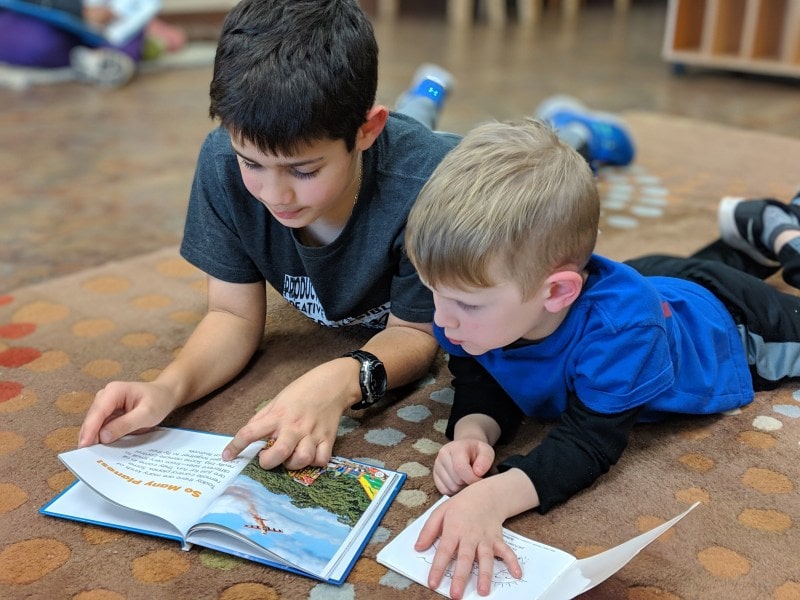In the dentist’s waiting room opposite me was a family with a daughter whom I estimated to be of ‘first grade age’. She was talking to her father about school. Hours had gone by and father was worried that they would be caught up, because the profession had been broken off so many times. Daughter indicated that all this would be on Magister (a digital apprentice portal) if her schedule was changed.
She wasn’t worried about it. It’s handy that parents have log-in codes, because Father apparently immediately looked up Magister’s link on his mobile phone. He told his daughter that for the rest of the week she had no homework in Magister. Daughter nodded happily in agreement and said ‘better’.
Then father read that next Tuesday she had mathematics as her only subject with homework. Oh, said the daughter, I think I already finished that, Father continued reading the homework of the week that followed.
Following the conversation, I wondered who was actually responsible for the homework here and how do we teach our children how to plan and organise? Do the students only do this from their mobile screens? Will they be able to oversee a school week? On Magister you can’t look ahead a week or plan homework and especially not on your mobile.
I immediately thought of my student with TOS in vmbo. His performance was worrisome and deteriorated rapidly. So last week I had a discussion with the mentor and his mother about his approach to homework and learning. I had asked this pupil if he had an agenda and he had confirmed that.
When I asked if I could see his diary, it turned out to be a very empty paper diary. I bought it neatly at the beginning of the school year. Neatly with him, but nothing was done with it.
When I ask him how he writes down his homework, he says: ‘I just look at Magister every evening or afternoon and it says what I have to do for the next day. He shrugged his shoulders when I asked him if he wouldn’t get into trouble with leatherwork. He had to learn that in one evening.
This is due to the lack of a paper agenda in our education. The teachers no longer write down the homework together with the pupils in the first class. There is no talk about planning and organizing. The pupil is referred back to himself.
Suddenly they have to be independent after group 8. Adolescents aged 12/13 who make the transition from primary to secondary education have to find their own way in organizing their homework as well as all the other changes. The only problem is that the executive functions of these young people are not yet aware of these expectations that we have.
Planning and organizing is a skill, an executive function, that needs to be taught and guided. Where do we teach our students that when it is not (anymore) explicitly offered or supervised at school.
All you have to do in the evening is look at that little mobile phone and looking ahead at that age is really not there yet.
I myself advocate a paper diary together with a planner (very nice planners are available at the Hema) where they can schedule their homework in a clear way every week and share tests to learn pieces. That’s a skill you need to learn. It is not a skill that develops spontaneously.

Well, who is responsible for this if the ‘apprentice brains’ are not yet mature enough for this? Who supports them in this? Adolescents quickly lose track of things and are also extra sensitive to distractions. It is very logical and understandable that a 13- or 14-year-old has difficulty with long-term plans. The brain is not yet equipped for this and needs to be taught a number of steps in this respect.
Let students at school, especially in the first class, start with a paper diary and teach them how to plan. This gives them a good basis for the years to come. Especially the care students need this ‘visual’ support of a paper diary and a planner to keep an overview.
Read, hear and see the request for help in the student’s behaviour
Undesirable behaviour is always noticeable in the classroom. Externalising behaviour is disturbing for the teacher and often also for fellow students. Internalising behaviour is often less noticeable.
“I want to have 20 in the classroom…” is then a familiar statement. They are students who are not likely to ask for help, who often muddle through themselves and keep themselves at bay.
However, this internalising problem can even lead to depression, brun-out and many other problems. Any form of undesirable behaviour is in the first place an enormous obstacle for the pupil himself with regard to school success and social-emotional wellbeing.
Is every behaviour ‘problem behaviour’?
If you want to pay attention to the undesirable behaviour and reduce it, you have to go to the source. And what is the source in this case? The source is the student’s behavior.
It is not the learning that is the problem, but the drill that is experienced as undesirable. It is not the learning force that needs help, but the learning.


